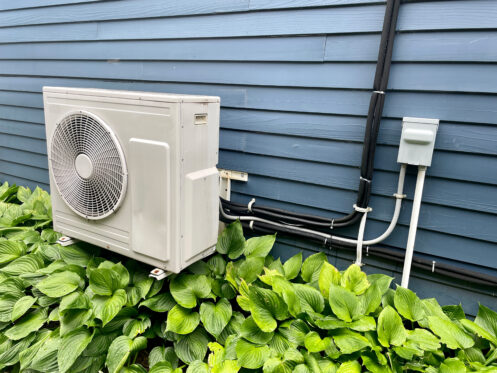When the AC in your Bridgeville, PA, home needs replacement, it represents a significant opportunity. That’s because upgrading your home to a heat pump will be the most advantageous time. If you’re unfamiliar with heat pumps, there are multiple reasons to jump at the chance. To explain, here’s what you need to know about heat pumps and three tips on switching to one.
What Is a Heat Pump?
By now, you’ve likely heard of heat pumps. However, if you’ve never owned one, you may not know what they are and what they can do. It doesn’t help that a ducted heat pump system looks almost identical to a central AC. It turns out that there’s a reason for that.
A heat pump uses the same operating methods and principles as the air conditioners you’re familiar with. The big difference is that they contain some extra parts. One of the most important among them is a reversing valve. It can change the direction that refrigerant flows through the system. That means a heat pump can heat and cool your home. More importantly, though, it can do both exceptionally efficiently.
In cooling mode, you can expect a heat pump to operate as efficiently as a high-end central AC. Most current-generation heat pumps boast a cooling coefficient of performance (COP) of at least 3.5. Many operate even more efficiently than that. In heating mode, though, heat pumps are even better. Some heat pumps reach COPs of 5 in ideal cold-weather conditions. Heat pumps’ value proposition is evident when considering that they are over five times as efficient as the best gas furnace.
How Heat Pumps Work
Heat pumps rely on the refrigeration cycle to function—the same process that makes your refrigerator work. In short, they manipulate a refrigerant’s pressure, state, and temperature to move heat around. In cooling mode, the low-pressure, cold refrigerant absorbs heat from your home’s air and carries it outside. In heating mode, it absorbs heat from the outside air to warm your home. As a result of that mode of operation, heat pumps consume no fuel to generate heat.
Understanding how heat pumps extract heat from cold outdoor air is something plenty of homeowners struggle to grasp. However, if you know some of the science behind the process, it’s easier to understand. For starters, you should know that one of the laws of thermodynamics states that heat spontaneously moves toward cold.
You should also know that the outside air always contains heat energy, even at sub-zero temperatures. All the heat pump needs to capture heat is a refrigerant colder than the outdoor air. It’s worth noting that the greater the differential between the refrigerant and air temperatures, the more efficient the process.
That is why heat pumps start losing efficiency at extremely low temperatures. When temperature differentials shrink, it takes more work to collect sufficient heat. In practice, most heat pumps begin losing efficiency when temperatures drop below 40 degrees.
However, they remain more efficient than the average gas furnace at about 25 degrees. Winter temperatures stay above that level in Bridgeville for most of the season. On colder days, a heat pump may engage an auxiliary heater to supplement its heating capacity. Even then, you’ll save money on your yearly energy bills with a heat pump.
3 Tips on Replacing Your AC With a Heat Pump
If your home currently has a ducted central AC, replacing it with a heat pump is straightforward. Here are three tips to help you get the most out of your upgrade.
1. Insist on a Manual J Calculation
When you have a new HVAC system installed in your home, your contractor must install the right size unit. If they don’t, you might not have enough heating or cooling capacity, or you may have too much, resulting in poor energy efficiency and a shortened system lifespan.
Your HVAC contractor must perform a Manual J calculation to get the system size right. That refers to an actual guidebook produced by the Air Conditioning Contractors of America. The manual describes a precise method for calculating a home’s heating and cooling load.
That calculation is critical when installing a heat pump to maximize its efficiency benefits. Factors that are considered are the size of the home, insulation, number of windows and doors, number of residents living there, and the outside environment.
2. Ask About Money-Saving Options
When you buy a new heat pump, you may be eligible for various tax credits and rebates to reduce costs. You should talk to your HVAC contractor to ensure you take advantage of them. For example, the federal Inflation Reduction Act provides a tax credit worth up to 30% of a heat pump’s cost.
That credit has a maximum value of $2,000 and isn’t refundable. The same law also authorized point-of-sale rebates worth up to $8,000 based on your income. The program should begin in 2025 and may dramatically lower the cost of a new heat pump. Local energy companies also provide rebates and incentives to install heat pumps.
3. Consider a Ductless Mini-Split System
Finally, you should know that there are other heat pump options besides ducted centralized systems. They also come in the form of ductless mini-split systems. Ductless mini-split units are an excellent option if your home’s ductwork is aging and needs significant repair. They are easily installed and won’t require substantial modifications to your home. Although more expensive than ducted systems, you may save money by avoiding a ductwork replacement.
Installing ductless mini-split systems comes with some notable advantages over centralized systems. One is that they’re more efficient than ducted systems. Your aging ductwork could result in a ducted heat pump wasting up to 40% of the energy it consumes.
Mini-split systems also provide your home with zoned heating and cooling. Each air handler attached to a mini-split system has a thermostat and temperature controls, which can transform your home’s comfort and help minimize operating costs. Mini-split systems also operate quietly and improve indoor air quality as they run.
Local Heat Pump Experts
The bottom line is that upgrading to a heat pump in your Bridgeville home is an excellent choice. When the time comes to make it, count on Coleman Mitchell Heating & Air Conditioning to help. Since opening our doors in 1990, we’ve been the go-to HVAC provider Bridgeville homeowners trust most. Each of our HVAC technicians has over 10 years of service under their belt and holds NATE certification.
We offer complete HVAC installation, repair, and maintenance services and indoor air quality services. We’re a Carrier Factory Authorized Dealer and the company’s President’s Award winner, so we only sell and install the finest quality heat pumps, ductless HVAC, and HVAC equipment.
We can even offer you financing on approved credit if you need it to pay for a new heat pump, so when you’re ready to replace the AC in your Bridgeville home with a heat pump, call Coleman Mitchell Heating & Air Conditioning immediately!
Contact Coleman Mitchell Heating & Air Conditioning today!







